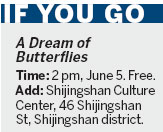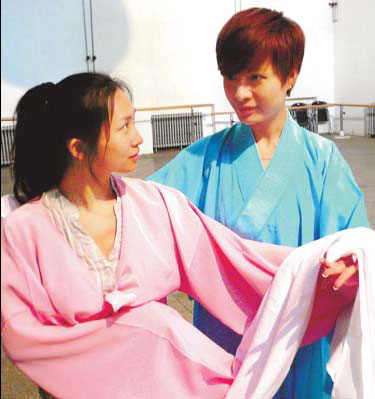Life
Singing the praises of an ancient art sound
By Zhang Zixuan (China Daily)
Updated: 2010-05-31 08:01
 |
Large Medium Small |
|
Chi Yingjie (left) rehearses Shaoxing Opera with another member of the Mingyue Club. ZHANG ZIXUAN / CHINA DAILY |
While many young Beijingers have to scratch their heads if they want to do something other than going to the KTV, pub or a restaurant after work, Wang Rui is never in any doubt how she wants to spend her spare time.
Every Sunday from 8.30 am to 1 pm, the 32-year-old office worker heads to the Shijingshan Culture Center where she practices Shaoxing Opera at the Mingyue Club.
"Performing Shaoxing Opera gives me so much joy," says Wang, who works at the Embassy of Finland when she is not singing.
Shaoxing Opera, which originated from Zhejiang province and is performed in the Shaoxing dialect, is said to be second only to Peking Opera in popularity in China.
Its exquisite vocals and elegant costumes attract audiences nationwide and it is especially popular in Shanghai as well as Jiangsu, Zhejiang and Fujian provinces.
"Learning more about traditional art forms such as Shaoxing Opera can be cool, too," said Li Han, 30, founder of Mingyue Club.
Li, who is a human resources manager by day, started the amateur club in April 2004. Since then, the voluntary organization has been providing training and giving members a chance to perform and enjoy Shaoxing Opera.
The club works hard on popularizing the art form and hopes to attract more young people to it, which is why members have taken productions into universities and communities.
"Having even a basic knowledge of Shaoxing Opera is not necessary," said Li. "Any girl who wants a break from her high-heels, computer and heavy workload can come and join us. Boys too!"
The club comprises more than 20 white-collar workers and college students. The average age of members is 25, prompting the club to call itself the most lively and fashionable Shaoxing Opera performance troupe in Beijing.
Chi Yingjie, postgraduate student from the Beijing Language and Culture University, joined in the club in 2008.
"My childhood dream has come true," said the 25-year-old.
Through the club, she has learned some classic Shaoxing operas including Butterfly Lovers, which is regarded as the Chinese equivalent of Romeo and Juliet.
"Most plays in Shaoxing Opera are love stories," Chi said. "It's not difficult for audiences who don't understand the Shaoxing dialect to catch their spirit."
The elegant movements and bright costumes are also big attractions for the growing number of young people being attracted to the art form, Chi said.
She said foreign classmates from her university saw her in action and were amazed by her skills with water sleeves as she pulled off a series of dazzling swirls.
"The Shaoxing dialect used in the opera has been innovated and made similar to Mandarin," said Wang, a Beijing local who had no trouble picking up the dialect. "It's learnable, as long as you practice."
Because one of the notable features of Shaoxing Opera is the fact that women often play the roles of men, there are far more female performers than male in the troupe. But that didn't stop Zhou Yangyang from getting in on the act.
As one of the only two male members of the Mingyue Club, Zhou is a rarity but he's enjoying himself.
The postgraduate student, who is majoring in electrical engineering, leaves from his distant university at 5:30 am in order to be at the practice sessions on time at 8:30 am.

"I'm quite enjoying it," he said. "I feel more energetic when I get back to study."
Members of the Mingyue Club are rehearsing for their next performance, Dream of Butterflies, which will be staged on June 5 at the Shijingshan Culture Center. The members of the club not only perform on stage but make their own costumes and props.
"We're recruiting more members," said Li. "We hope people will come along if they want to do something fun and meaningful at the same time."
